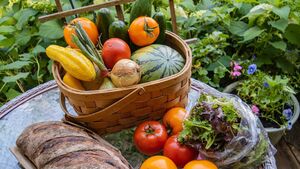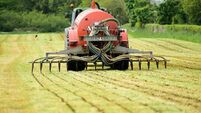Living Greener: Communities should bypass the supermarkets and buy straight from farmers

Typically, each family buys a standard share of the farm’s produce, and in exchange, they receive a box of crops each week for the rest of the season.
When people start their own business venture, they usually prefer finding investors to relying solely on a bank loan – many other people can share in your risk and rewards, and they find it in their interest to help you succeed.
Now, some farmers are using this model, selling shares of their farms to the people who will eat the crops. Under a system called Community-Supported Agriculture (CSA), local residents invest in a farm at the beginning of the year, before the crops have been planted.
Typically, each family buys a standard share of the farm’s produce, and in exchange, they receive a box of crops each week for the rest of the season. What they receive will depend on the time of year, but if a farmer plants enough variety, any week’s box will likely have several different kinds of crops, whether delivered in May or October.
Such projects make a farm particularly resilient in the face of global financial crises. A CSA farm does not depend on loans from major banks to continue from year to year, nor do its crop sales depend on the vagaries of faraway markets.
A CSA pays the farmer early in the year, so that the farm does not have to go deeply in debt each year, and it allows the farmer to market their food before their 16-hour days begin.
Sometimes a CSA plan finds a use for plots near towns that otherwise might go unused. They provide work for farmers in an age when their numbers are diminishing – and if the community hires young people as hands, they give wages and rural skills to local youths.
In addition, CSAs allow neighbours to form a personal relationship with the person who is growing their food, and allows the farmer to hear and respond to consumer demand quickly, without the need for commissioning survey groups.
Since people must invest in the farm, they usually must come to the farm at least once a year, and get to meet the farmer and see where their food comes from. They must accept a variety of vegetables and learn to cook them.
But perhaps the most important use of such farms is giving a community food that is not flown in from across an ocean. We are surrounded by fertile land here in Ireland, yet we import 90 per cent of our food. If there were a crisis – a political meltdown, an economic crash, use your imagination -- we would have to rebuild much of our local agriculture from scratch.
Food transported from one kilometre away, rather than 10,000, eliminates a major source of climate chaos and pollution. At present, many foods must be sealed in plastic and foam packaging, sometimes preserved in chemical gases, to delay spoilage.
Some experts estimate that by the time your food reaches your plate, 75 per cent of the nutrition is gone. If the farm is next door, the food is always fresh, and no rubbish need be generated. Also, we would not use those thousands of gallons of fossil fuel right away, and do our part to delay a global energy crunch.
CSAs can go beyond vegetables as well, to include grains, meat, home-made bread, eggs, cheese, flowers or fruit. Several farmers could join forces to create a regional CSA, coordinating their efforts – one supplying chickens, for example, and another supplying vegetables.
When I lived in Minnesota, USA, we used a CSA, and for a monthly fee, we got a box of whatever was in season: parsley roots or celeriac, kohlrabi or rutabaga, mange tout or yams. This might sound inconvenient to people used to selecting anything they want from a supermarket, but it was much more convenient than having to make that trip; instead, food just came to you.
You knew exactly where your money was going, it was a predictable amount each month, and you knew where your food was coming from, and you knew that since it was coming from nearby and was in season, it would be the most ecologically sustainable food you could have other than growing it in your yard.
Finally, not knowing what you would get means that you were forced to try new things, new recipes, and found new things to love.
Projects like this could help local farmers who are struggling through waves of recession, pandemic, quarantine and regulations, all without changing much of what they already do. It just means selling shares of the farm to reliable customers, and delivering to them, and bypassing giant conglomerates.





